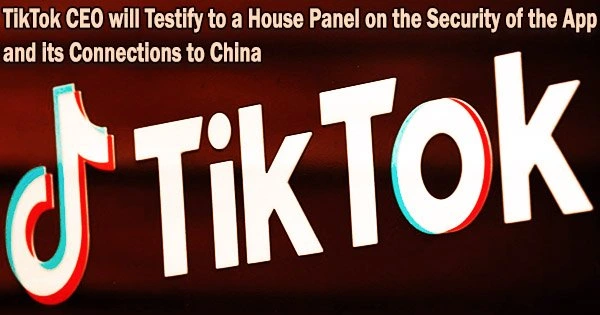TikTok is a social media platform and mobile application that allows users to create and share short videos set to music and other audio. Launched in 2016 by the Chinese company ByteDance, it has become extremely popular, especially among younger users.
TikTok CEO Shou Zi Chew will testify before a House panel on March 23 about the app’s security and privacy practices and its ties to China through parent company ByteDance.
Chew would be appearing before a legislative panel for the first time, according to the House Energy and Commerce Committee, which announced the hearing on Monday.
“ByteDance-owned TikTok has knowingly allowed the ability for the Chinese Communist Party to access American user data,” E&C Chair Cathy McMorris Rodgers, R-Wash., said in a statement. “Americans deserve to know how these actions impact their privacy and data security, as well as what actions TikTok is taking to keep our kids safe from online and offline harms.”
A TikTok spokesperson said in a statement that they “welcome the opportunity to set the record straight about TikTok, ByteDance, and the commitments we are making to address concerns about U.S. national security before the House Committee on Energy and Commerce.”
But, the spokesperson added, “There is no truth to Rep. McMorris Rodgers’ claim that TikTok has made U.S. user data available to the Chinese Communist Party. The Chinese Communist Party has neither direct nor indirect control of ByteDance or TikTok. Moreover, under the proposal we have devised with our country’s top national security agencies through CFIUS, that kind of data sharing or any other form of foreign influence over the TikTok platform in the United States would not be possible.”
The spokesperson said they hoped by sharing details of its plans with the committee, “Congress can take a more deliberative approach to the issues at hand.”
The announcement comes after the company’s discussions with the American authorities on how to safeguard its app there have dragged on for a while. TikTok has been interacting with the Committee on Foreign Investment in the United States, which has the authority to judge whether certain risk mitigation measures are sufficient to allay worries about national security.
However, it appears that such discussions have been put off at least until this past month since officials are still concerned about the effects of the app’s ownership by the Chinese parent business ByteDance. That’s because Chinese-based companies can be compelled to hand over data to the government there on request.
In the past, TikTok has assured U.S. officials and lawmakers that it does not store U.S. user data in China to mitigate that risk, but that’s done little to assuage fears.
Fears over TikTok’s national security and privacy implications for consumers have spanned both sides of Congress and stretched from the Trump administration into the Biden administration. Lawmakers passed a ban on TikTok on government devices in a year-end legislative package, citing security fears.
A TikTok spokesperson called the passage of the bill “a political gesture that will do nothing to advance national security interests,” in a statement at the time, adding that the agreement CFIUS was reviewing would “meaningfully address any security concerns that have been raised at both the federal and state level.”
















